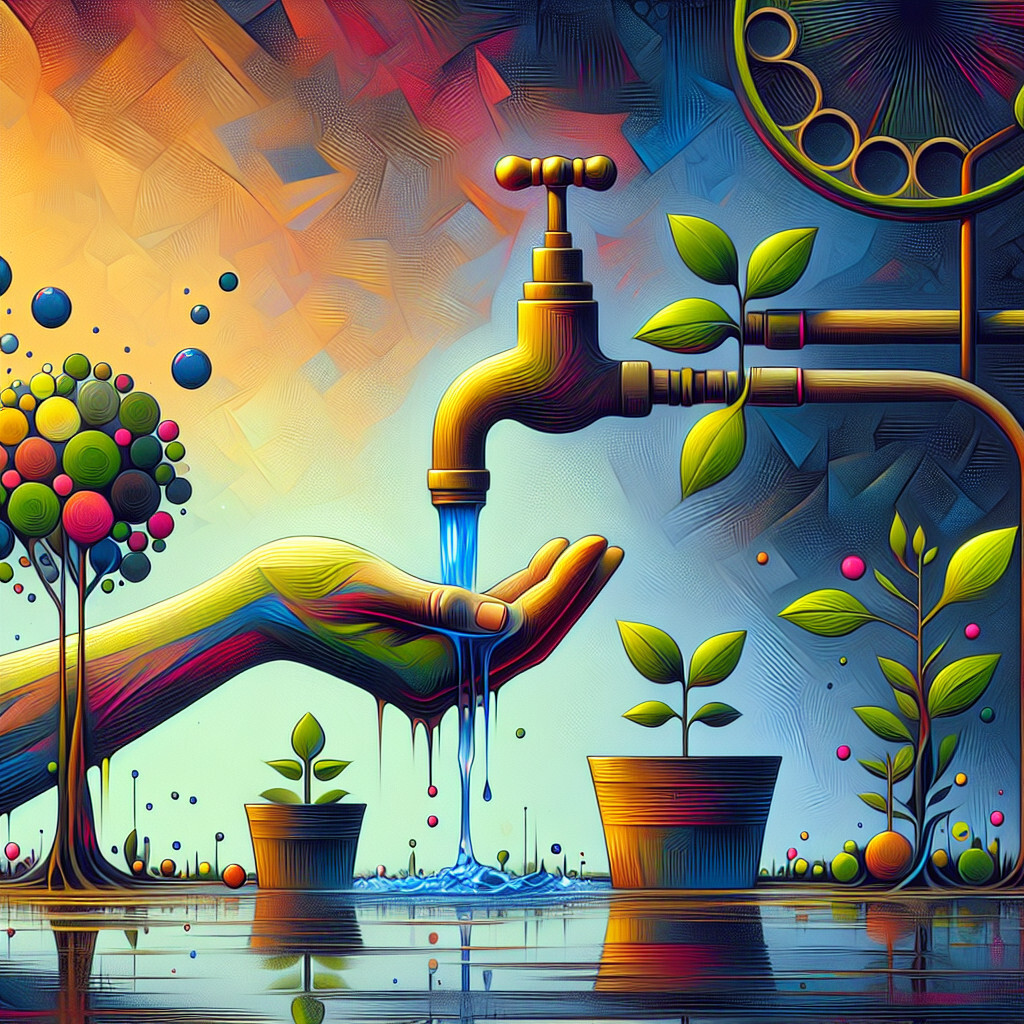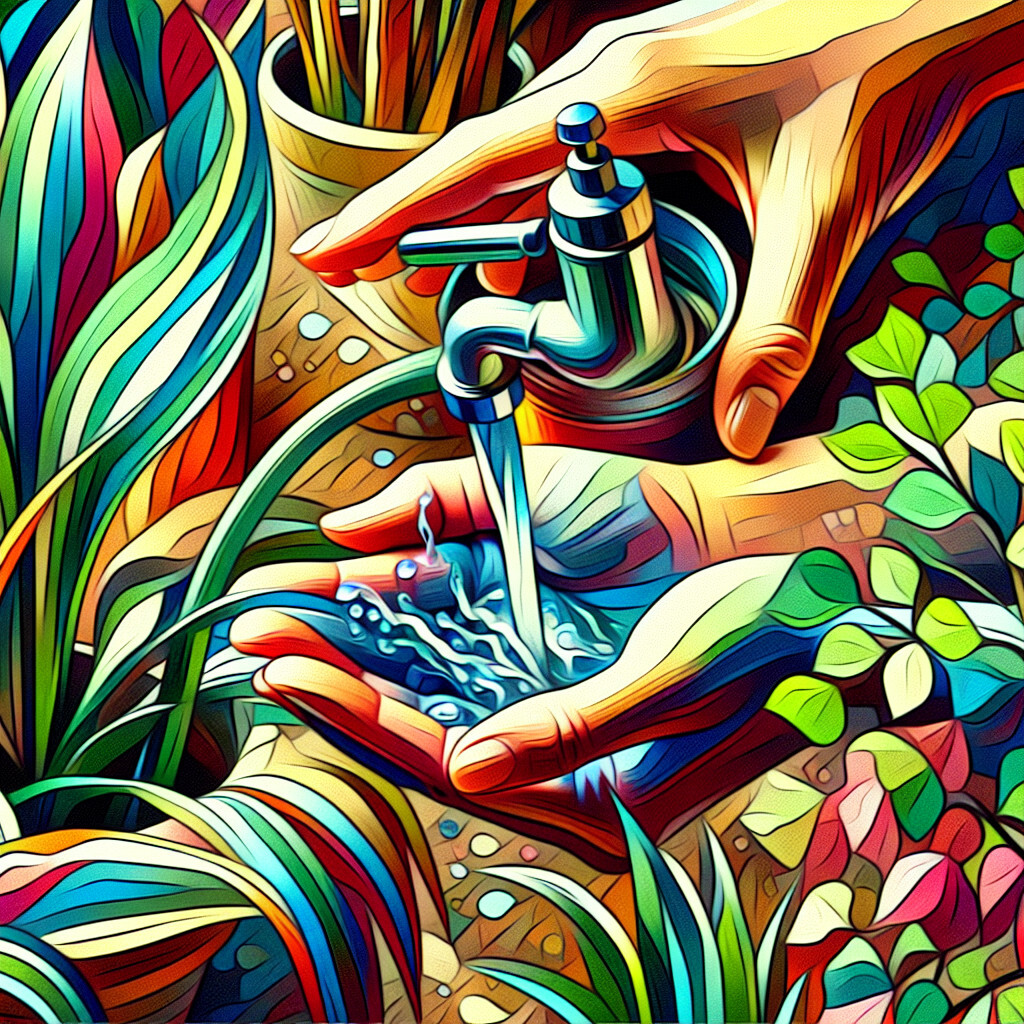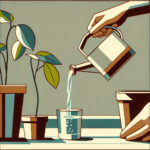-
Table of Contents
“Quenching Nature’s Thirst: Tap Water for Plants”
Introduction

Tap water can indeed be given to plants as a source of hydration. However, the suitability of tap water for plants can vary based on the quality and treatment of the water. Factors such as chlorine content, hardness, pH level, and the presence of certain minerals can affect plant health. While some plants can tolerate these elements, others may show signs of distress or poor growth. Therefore, understanding the specific needs of your plants and the quality of your tap water is crucial for optimal plant care.
Understanding the Effects of Tap Water on Plant Growth
Water is a fundamental requirement for plant growth, but not all water is created equal. As a gardener, you may wonder if tap water is suitable for your plants. The answer to this question is not as straightforward as it may seem, as the effects of tap water on plant growth can vary greatly depending on several factors.
Tap water is often treated with a variety of chemicals to make it safe for human consumption. These chemicals, which include chlorine, chloramines, and fluoride, can have a significant impact on plant health. Chlorine and chloramines are used to disinfect water and kill harmful bacteria. While these substances are generally safe for humans, they can be harmful to plants, particularly those that are sensitive or have a low tolerance for chemicals.
Chlorine can interfere with plant growth by inhibiting photosynthesis, the process by which plants convert light energy into chemical energy. This can lead to stunted growth, yellowing leaves, and a general decline in plant health. Chloramines, on the other hand, are more stable and remain in the water longer than chlorine. This can lead to a buildup of these chemicals in the soil, which can damage plant roots and inhibit nutrient uptake.
Fluoride, another common additive in tap water, can also be harmful to plants. While small amounts of fluoride can be beneficial for certain plants, excessive amounts can cause a condition known as fluorosis, which results in leaf tip burn, discoloration, and reduced growth.
The pH level of tap water can also affect plant growth. Most tap water falls within a pH range of 6.5 to 8.5, which is slightly alkaline. While many plants can tolerate this pH range, others prefer more acidic conditions. If the pH of the water is too high, it can interfere with a plant’s ability to absorb certain nutrients, leading to nutrient deficiencies.
The hardness or softness of tap water, determined by its mineral content, can also impact plant health. Hard water, which is high in minerals like calcium and magnesium, can lead to the buildup of mineral salts in the soil. This can interfere with a plant’s ability to absorb water and nutrients, leading to poor growth and health. On the other hand, soft water, which is treated with sodium to remove these minerals, can lead to a sodium buildup in the soil, which can also be harmful to plants.
Despite these potential issues, many gardeners successfully use tap water for their plants. If you’re concerned about the effects of tap water on your plants, there are several steps you can take. Letting tap water sit out for 24 hours before using it can allow chlorine to evaporate. Testing the pH of your water can help you determine if you need to adjust it to meet your plants’ needs. Using a water softener or filter can help remove harmful chemicals and minerals.
In conclusion, while tap water can have potential negative effects on plant growth, with careful management and consideration, it can still be a viable option for watering your plants. Understanding the specific needs of your plants and the quality of your tap water can help you make the best decision for your garden.
Can Tap Water Harm Your Plants? Unveiling the Truth
Water is a fundamental requirement for plant growth, but it’s not uncommon for gardeners to wonder if tap water is safe for their plants. The question arises due to the various chemicals and minerals found in tap water that may not be present in rainwater or distilled water. The truth is, while tap water is generally safe for most plants, there are certain circumstances where it could potentially harm your plants.
Tap water quality can vary greatly depending on the source and treatment process. It often contains added chemicals, such as chlorine and chloramine, which are used to kill bacteria and other harmful organisms. While these chemicals are safe for humans, they can be harmful to plants, especially those that are sensitive or have a low tolerance for chemicals. Chlorine, for instance, can cause leaf burn and inhibit plant growth. However, it’s worth noting that chlorine will evaporate if the water is left standing for a day or two, making it safer for your plants.
Another concern with tap water is its hardness or softness, which refers to the concentration of calcium and magnesium salts. Hard water has high levels of these minerals and can lead to a buildup of mineral salts in the soil, which can affect a plant’s ability to absorb water and nutrients. On the other hand, soft water is often treated with sodium, which can interfere with the absorption of other essential nutrients like potassium and magnesium.
The pH level of tap water can also be a concern. Most tap water tends to be slightly alkaline, with a pH above 7. Many plants prefer slightly acidic conditions, with a pH between 6 and 7. Using alkaline tap water can gradually increase the pH of your soil, potentially harming plants that prefer acidic conditions.
However, it’s important to remember that these potential issues with tap water don’t mean it’s always harmful to plants. Many plants are quite tolerant of the chemicals and minerals in tap water, and some may even benefit from the added nutrients. For instance, calcium and magnesium in hard water can be beneficial for plants that require these nutrients.
If you’re concerned about the potential effects of tap water on your plants, there are a few steps you can take. First, consider having your tap water tested. This can give you a better idea of its pH, hardness, and chemical content. If your tap water is high in chlorine, let it sit out for a day or two before watering your plants to allow the chlorine to evaporate. If your tap water is hard, you might consider using a water softener or mixing in some distilled or rainwater to reduce the mineral content.
In conclusion, while tap water can potentially harm some plants due to its chemical content, hardness, or pH level, it’s generally safe for most plants. By understanding the specific needs of your plants and the quality of your tap water, you can ensure that your plants get the water they need without any harmful effects.
The Pros and Cons of Using Tap Water for Indoor Plants
Water is a fundamental requirement for the growth and survival of plants. However, the type of water used can significantly impact the health and development of your indoor plants. One common source of water for indoor plants is tap water. While it is readily available and convenient, it is essential to understand the pros and cons of using tap water for indoor plants.
One of the primary advantages of using tap water for indoor plants is its accessibility. It is readily available in most households, making it a convenient option for plant owners. Additionally, tap water is typically treated and sanitized, reducing the risk of harmful pathogens that could potentially harm your plants. Furthermore, tap water often contains minerals such as calcium and magnesium, which are beneficial to plant growth. These minerals can supplement the nutritional needs of your plants, promoting healthier growth and development.
However, the use of tap water for indoor plants is not without its drawbacks. One of the main concerns is the presence of chlorine. While chlorine is added to tap water to kill bacteria and other harmful microorganisms, it can be detrimental to plants. Chlorine can cause damage to plant cells, inhibiting growth and potentially leading to the death of the plant. To mitigate this, it is recommended to let tap water sit for 24 hours before using it on plants, allowing the chlorine to evaporate.
Another concern with using tap water for indoor plants is the potential for a high mineral content, specifically calcium and magnesium. While these minerals are beneficial in moderate amounts, excessive levels can lead to a condition known as “hard water.” Hard water can cause mineral buildup in the soil, which can interfere with the plant’s ability to absorb water and nutrients effectively. This can lead to stunted growth and other health issues for your plants.
The pH level of tap water is another factor to consider. Most tap water tends to be slightly alkaline, with a pH above 7. However, many indoor plants prefer slightly acidic conditions, with a pH below 7. Using tap water can therefore alter the pH of the soil, potentially making it less suitable for your plants. Regularly testing and adjusting the pH of your soil can help mitigate this issue.
Lastly, tap water may contain fluoride, another chemical added to municipal water supplies. While fluoride is harmless to humans, certain plants, such as spider plants and dracaenas, are sensitive to it and can develop leaf tip burn as a result.
In conclusion, while tap water is a convenient and accessible option for watering indoor plants, it comes with potential drawbacks. The presence of chlorine, the potential for hard water, the pH level, and the presence of fluoride are all factors that can negatively impact the health of your plants. Therefore, it is crucial to consider these factors and take necessary precautions when using tap water for indoor plants. This could include letting the water sit to allow chlorine to evaporate, regularly testing and adjusting the soil pH, and being aware of the specific water requirements of your plants.
Tap Water vs. Distilled Water: Which is Better for Your Plants?
Water is a fundamental requirement for plant growth, but not all water is created equal. Different sources of water contain varying amounts of minerals and other elements that can affect plant health. Two common types of water used for plants are tap water and distilled water. The question often arises: which is better for your plants?
Tap water is the most readily available type of water and is often used for watering plants due to its convenience. It contains minerals like calcium, magnesium, and sodium, which are essential for plant growth. However, the quality of tap water can vary greatly depending on the location. In some areas, tap water may contain high levels of chlorine, fluoride, or other chemicals that can be harmful to plants. Additionally, hard tap water, which has high mineral content, can lead to mineral buildup in the soil, affecting the plant’s ability to absorb water and nutrients.
On the other hand, distilled water is water that has been boiled into vapor and condensed back into liquid in a separate container. This process removes impurities and minerals from the water. Distilled water is pure and free of any chemicals or minerals. This might seem like the ideal choice for plants, but it’s not that simple. While distilled water won’t harm plants, it also doesn’t provide any of the beneficial minerals found in tap water. Over time, using distilled water can lead to nutrient deficiencies in plants, unless supplemented with a good quality plant fertilizer.
So, which is better for your plants? The answer is not straightforward and depends on several factors. If your tap water is of good quality, it can be beneficial for your plants due to the essential minerals it contains. However, if your tap water is hard or contains high levels of harmful chemicals, it might be better to use distilled water and supplement with a plant fertilizer to provide necessary nutrients.
It’s also worth noting that different types of plants have different water requirements. Some plants, like carnivorous plants or certain types of orchids, prefer rainwater or distilled water due to their sensitivity to minerals. Other plants, like most vegetables and flowers, can thrive with tap water, provided it’s not too hard or chemically treated.
In conclusion, both tap water and distilled water have their pros and cons when it comes to plant care. The best approach is to understand the quality of your tap water and the specific needs of your plants. Regularly check your plants for signs of distress, such as yellowing leaves or stunted growth, which could indicate a problem with the water or nutrient levels. With careful observation and a little research, you can determine the best type of water to use for your plants. Remember, the goal is to provide your plants with the best possible environment for growth, and water quality plays a significant role in achieving this.
Q&A
1. Question: Can you give tap water to plants?
Answer: Yes, you can give tap water to most plants. However, some sensitive plants may not tolerate the chlorine often found in tap water.
2. Question: Is tap water harmful to plants?
Answer: Generally, tap water is not harmful to plants. But in areas where the water is heavily treated or contains high mineral content, it could potentially harm sensitive plants.
3. Question: Can the chlorine in tap water damage my plants?
Answer: Most plants can tolerate the small amounts of chlorine found in tap water. However, for sensitive plants, it’s recommended to let the water sit out for 24 hours to allow the chlorine to evaporate before watering.
4. Question: What can I do if my tap water is too hard for my plants?
Answer: If your tap water is too hard, meaning it has a high mineral content, you can use distilled water or rainwater to water your plants. Alternatively, you can also install a water softening system.
Conclusion
In conclusion, tap water can be given to plants as it generally contains the necessary nutrients for plant growth. However, if the tap water is heavily treated with chemicals or has a high mineral content, it may not be suitable for some sensitive plants.






